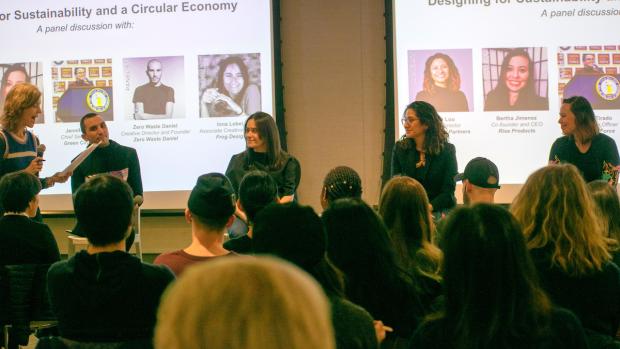Design Week at NYU Tandon revolves around the idea of a circular economy

Associate Professor Anne-Laure Fayard facilitated the panel discussion, “Designing for a circular economy and sustainability,” part of the Design Week lineup.
NYU Tandon’s second annual Design Week took place from February 10 to 14, and while the weather outside may have been bleak, the atmosphere in the MakerSpace, which hosted a packed schedule of events, was anything but.
“We hit upon the idea of holding Design Week in February because it’s a month in which many students need motivation and inspiration,” said Victoria Bill, the founding director of the MakerSpace. “It’s especially important for them to brainstorm and explore new themes as they prepare to engage in upcoming events like HackNYU and the Prototyping Fund competition.”
This year, Design Week took as its theme Sustainability and the Circular Economy.
“Our current linear economy involves taking resources, making something from them, and then throwing those items away when we no longer want them, with no regard to waste,” explained Christina Lafontaine, the MakerSpace design specialist. “That’s obviously not sustainable if we’re going to build a viable economy that benefits everyone in the long run.”
By contrast, a circular economy calls for eliminating waste and pollution right in the design phase, from step one; reusing products and materials and keeping them in circulation; and regenerating natural systems, thereby not only protecting the environment but actively improving it.
Among the eagerly anticipated events of the week was a screening of Tomorrow, a French film that received a César (French Oscar) for Best Documentary of 2016. The optimistic movie showcases creative, alternative modes of agriculture, economics, energy generation, and education.
“The film makes clear that if enough people act on a local or even personal level, it can make a difference on a much wider scale,” said Bill. “The workshops we planned for Design Week reinforce that idea even further. Participants learned about small changes they, themselves, can easily make that collectively have a large impact.”
One popular workshop focused on food waste and gave a plethora of practical tips (such as making broth with vegetable scraps), while others dealt with water testing and how to identify different types of plastic.
An undisputed highlight of the week, facilitated by Anne-Laure Fayard, Associate Professor in the Department of Technology Management and Innovation, was the panel discussion, “Designing for a circular economy and sustainability,” which drew a passionate and inspiring group of engineers, designers, and social innovators, all dedicated to disrupting traditional linear ways of doing things in multiple domains (from food to fashion and energy). On hand were:
- Bertha Jimenez, an NYU Tandon alum, co-founder and CEO of Rise Products, a food-tech startup that uses its patent-pending process and technology to convert organic byproducts into food-grade ingredients
- Inna Lobel, the associate creative director at Frog Design, an internationally renowned design and innovation consultancy
- Paula Luu, project director at Closed Loop Partners, an investment firm devoted to building and transitioning the circular economy
- Jennifer Tirado, chief service officer at Green City Force (GCF), an AmeriCorps organization that recruits young adults in New York City public housing to serve and train in the sector of sustainability
- The designer known as Zero Waste Daniel, creative director and founder of an eponymous line of sustainable fashion
A circular economy invites us to “design, make and use things within planetary boundaries” according to the Ellen McArthur Foundation. “But what does this mean in practice? And what is the role of design in this process of moving away from the linear systems that have lasted for the past centuries?” Fayard asked the panelists, sparking a rich and meaningful conversation that culminated with a lively Q&A.
Those who came to hear the panel discuss their work were treated to snacks by pastry chef Anna J. Fitting, who used flour milled from brewery byproducts by Jimenez’s company to make savory crackers and an ale-flavored banana bread.
“If you read the statistics — the equivalent of one garbage truck of textiles is landfilled or burnt each second; about one-third of food produced for human consumption is wasted each year; by 2050 the oceans could have more plastic than fish — it is clear that our current way of doing things is no longer working for people, for the environment and for businesses alike,” said Fayard, who serves as faculty advisor the Design Lab at the MakerSpace. “Design Week aims to create awareness and inspire the NYU community and visitors beyond NYU — to show that it’s possible to redesign products, services, and even entire communities and encourage a grassroots move away from linear systems that we know simply can’t last.”




